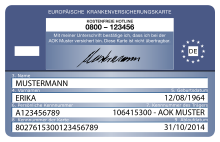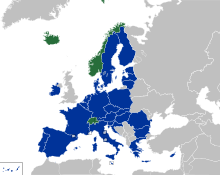European Health Insurance Card




The European Health Insurance Card (or EHIC) is issued free of charge and allows anyone who is insured by or covered by a statutory social security scheme of the EEA countries and Switzerland to receive medical treatment in another member state for free or at a reduced cost, if that treatment becomes necessary during their visit (for example, due to illness or an accident), or if they have a chronic pre-existing condition which requires care such as kidney dialysis. It is valid for 5 years.
The intention of the scheme is to allow people to continue their stay in a country without having to return home for medical care; as such, it does not cover people who have visited a country for the purpose of obtaining medical care, nor does it cover care, such as many types of dental treatment, which can be delayed until the individual returns to his or her home country.
It only covers healthcare which is normally covered by a statutory health care system in the visited country, so it does not render travel insurance obsolete.
The card was phased in from 1 June 2004 and throughout 2005, becoming the sole healthcare entitlement document on 1 January 2006. The card is applicable in all French overseas departments (Martinique, Guadeloupe, Réunion and French Guiana) as they are part of the EEA, but not non-EEA dependent territories such as Jersey, the Isle of Man, Aruba or French Polynesia.[1] However there are agreements for the use of the EHIC in the Faroe Islands and Greenland,[2] even though they are not in the EEA.
The reason for the existence of this card, is that the right to health care in Europe is based on the country of legal residence, not the country of citizenship. Therefore a passport is not enough to receive health care. It is however possible that a photo id document is asked for, since the European Health Insurance Card does not contain a photo.
In some cases, even if a person is covered by the health insurance of an EU country, one is not eligible for a European Health Insurance Card. For instance, in Romania, a person who is currently insured has to have been insured for the previous five years to be eligible.[3]
It replaced the following medical forms:
- E110 - For international road hauliers
- E111 - For tourists
- E119 - For unemployed people/job seekers
- E128 - For students and workers in another member state.
A smartphone application (called European Health Insurance Card) is available for iOS, Android and Windows mobile, which includes information in 24 languages on how to use the European Health Insurance Card in all the participating countries. It includes general information about the card, emergency phone numbers, covered treatments and costs, how to claim reimbursement and who to contact in case you have lost your card. It does not replace the card, which is still needed.
Third party application processors
European Health Insurance cards are provided free to all citizens of participating countries. There are however various businesses who act as non-official agents on behalf of individuals, arranging supply of the cards in return for payment, often offering additional services such as the checking of applications for errors and general advice or assistance.[citation needed] This has proved extremely controversial. In 2010 the British government moved against companies that invited people to pay for the free EHIC, falsely implying that through payment the applicant could speed up the process.[4][5] Despite this, the practice continues.[6][7]
Participating countries

As of 2013, 32 countries in Europe participate: the member states of the European Economic Area (EEA) plus Switzerland. This coincides with the 28 member states of the European Union (EU) and 4 member states of the European Free Trade Association (EFTA).
|
|
|
|
The Channel Islands and Isle of Man do not supply coverage under the EHIC, and their residents are not eligible for EHICs.
See also
References
- ^ "UK FCO Travel Advice: French Polynesia". Fco.gov.uk. 2012-09-12. Retrieved 2012-10-12.
- ^ "UK FCO Travel Advice: Denmark". Fco.gov.uk. Retrieved 2012-10-12.
- ^ "Cardul european de asigurări de sănătate, eliberat gratuit". Libertatea.ro. 2009-08-01. Retrieved 2012-10-12.
- ^ "BBC News - European health card scam stopped by OFT". Bbc.co.uk. 2010-08-10. Retrieved 2012-10-12.
- ^ "Consumers warned to be search engine savvy – Consumer Focus Wales". Consumerfocus.org.uk. 2011-06-22. Retrieved 2012-10-12.
- ^ Ray Massey (2011-07-01). "Millions duped into paying for free EU health cards | Mail Online". Dailymail.co.uk. Retrieved 2012-10-12.
- ^ James Coney (2012-06-20). "EHIC scam warning - don't pay for a card". This is Money. Retrieved 2012-10-12.
External links
- UK EHIC application
- General UK EHIC information
- EU site about the EHIC
- Irish EHIC site - includes details of coverage in various countries
- Dutch EHIC website
- Accessing healthcare in Switzerland
- Warning over health card renewals
